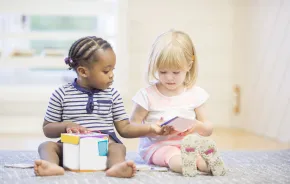 My 3-year-old was out of control. She was running laps in the house, knocking into things and generally leaving a trail in her wake.
My 3-year-old was out of control. She was running laps in the house, knocking into things and generally leaving a trail in her wake.
After multiple attempts to remind her of our no-running rule, I pulled out my go-to mommy threat, the one that works every time with her older sister. “Do you want a time-out?” I yelled after her.
“OK!” she exclaimed, skipped over to the time-out seat, sat down and smiled sweetly back at me.
Hmmm.
What can a parent do when the old discipline standbys aren’t effective?
It turns out that one size doesn’t fit all when it comes to discipline. But, with a little creativity and a lot of patience, parents can address their 3- to 7-year-olds’ behavior problems and help set their kids up for success. Here are six keys to creating effective, creative consequences for your child:
Be clear about what you’re trying to accomplish
The first thing you need to ask yourself, says Leah Koenig, a Bellevue-based parenting coach, is what do you want to achieve with your discipline?
“Sometimes parents are just angry and trying to prove they are in control,” Koenig says. “That makes the consequence they give more punitive. But if they can put their feelings aside, they can be more creative and figure out what the learning is that their child needs.”
Molly Frierman Jolly, a mother of three from Virginia Beach, got creative to help her kids learn to take responsibility for their toys. “I was at my wit’s end, with the kids leaving their things out each night,” she recalls. “Finally, I told them that anything left out would become mommy’s property.” The first night, she gathered the untidy toys, piled them in a crate and left a note that read:
“You left it out
and now it’s mine.
If you want it back
Do a chore to pay the fine.”
Molly’s kids quickly learned to clean up before bedtime, and she reports the crate has been empty for weeks.
Create (or allow) natural consequences
Creativity can help parents think past the old standbys to find consequences that will reinforce their child’s learning need in the moment.
“At this age, bad behavior is unintentional. These kids are like little scientists trying to figure out what the limits are,” Koenig explains. “When it comes to discipline, it’s all about trying to create a natural learning.”
For example, if kids don't do their homework, the consequence may involve missing playtime to get the work done. And if a child leaves a favorite toy out in the rain, the natural consequence may be that the toy becomes ruined.
Sometimes failing is the natural consequence. “I’d rather my kids fail now and learn how to pick themselves up, than later when they’re teens and faced with pressures like drinking and drugs,” says Mindy Benton, an elementary school counselor from Charlotte, North Carolina. “In elementary school, parents are quick to rescue their child if they forget their homework or get picked on. They don’t want the kids to be in a tough situation, so they come in and fix it. But when they do that, the kids don’t learn coping skills.”
Make the consequence fit the misbehavior
Tracey Brownrigg, a Chicago-based early childhood consultant, says to make sure consequences are directly linked to the child’s action. “When we ask our daughter to go inside and she continues to ride her bike, she gets her bike taken away for a day. If you say, ‘You can’t watch TV for a week,’ that doesn’t make sense.”
“Another time, the kids wouldn't stop fighting in the car, and the distraction was making it dangerous for me to drive,” she says. “I pulled over, made the kids sit on the side of the road with me, and I wouldn’t let them back in the car until they calmed down.”
It’s also important to make sure the consequences match the severity of the behavior. “Sometimes parents want to show they’re in control and they’ll blurt out something like ‘No TV for a month.’ But that may be hard to follow through on.”
Create age-appropriate consequences
“Around ages 5 to 7 is when kids truly start to understand the consequences of their actions,” says Brownrigg. “So if a 3-year-old hits someone with a toy, I might take it away and give them a time-out to calm them down. But I won’t tell them to think about what they did, because they can’t understand that. What they’ll think about is the fact that you sat them down.”
A 5-year-old is more able to connect his action with the consequence. A slightly longer-term consequence, such as taking away a toy for the rest of the day, may be effective.
Plan consequences ahead of time
“Kids make the same mistakes over and over again, so you can figure out good natural consequences for the mistakes your child makes,” said Koenig.
If a child’s mistakes become repetitive, parents should take a fresh look at the problem, says Koenig. For example, if a child is late for school each morning, the parent should look at the routine, make changes and help the child change his behavior.
At one point, Benton’s daughter was coming to her to solve all of her problems. To break the pattern and help her daughter learn to solve her own problems, she started saying, “‘I’m sorry that happened. What are you going to do about it?’” At first, says Benton, her daughter was taken aback. Then Benton offered to give her some ideas. “Now she doesn’t come to me to solve everything, but when she does, she asks, ‘Mommy, do you have any ideas?’”
Don’t react emotionally
Dealing with difficult behavior can be frustrating. It’s easy for parents to let the situation get the best of them, says Benton. But by not getting emotional, you can be more effective and creative. And it’s fine to tell your child that you will discuss it later — when everyone has cooled off.
“Just because I don’t give a consequence immediately doesn’t mean I’ve lost any authority or power, because I can come back, follow through more calmly and come up with a consequence that will be more effective.”









